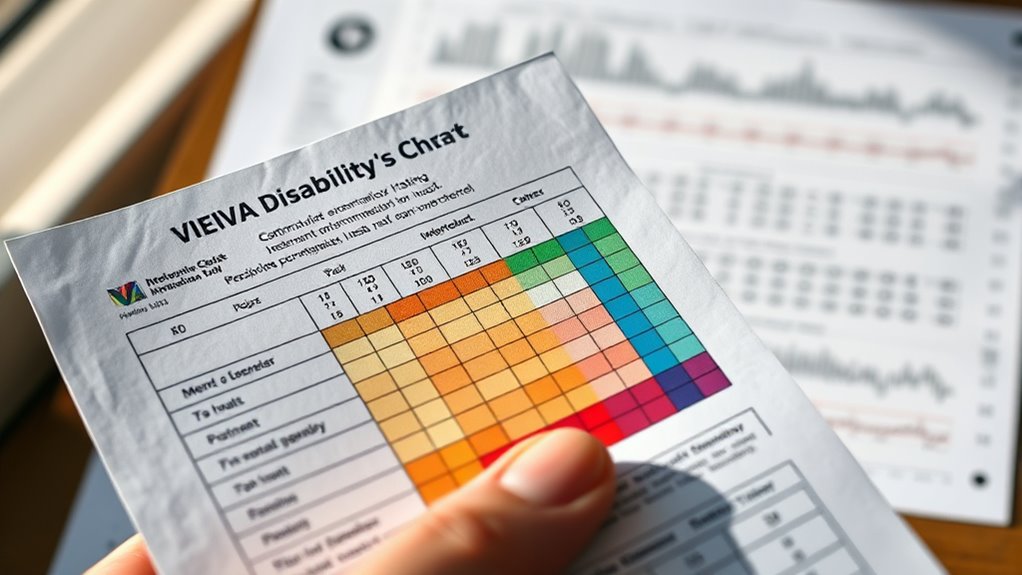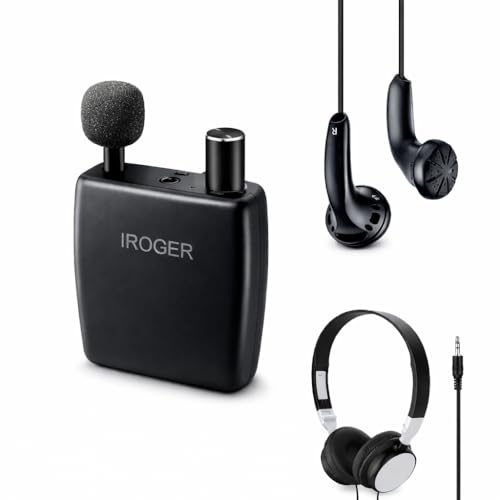To understand your VA disability rating for hearing loss, you need to know that it’s based on your audiology test results and how your hearing impacts your daily life. The VA considers your specific hearing loss, speech recognition, and use of hearing aids or cochlear implants. Higher decibel loss usually means a higher percentage rating. If you want to learn more about how these factors combine, keep exploring how the VA evaluates hearing disabilities.
Key Takeaways
- VA assigns disability ratings based on audiology test scores, including decibel loss and speech recognition, within a standardized schedule.
- Higher hearing loss severity correlates with higher percentage ratings, affecting communication and daily activities.
- Use of hearing aids or cochlear implants supports your claim but doesn’t automatically increase your rating.
- Accurate documentation of hearing difficulties and assistive device use is essential for an effective claim.
- VA evaluations focus on how hearing loss impacts functioning, not just test results, guiding the overall disability percentage.

If you’re a veteran experiencing hearing loss, understanding how the VA assigns disability ratings is essential. The VA uses a specific process to evaluate your hearing impairment, which directly impacts the benefits you receive. This process begins with a thorough assessment, often involving audiology tests that measure your hearing ability across different pitches and volumes. These tests help determine the degree of your hearing loss and the impact it has on your daily life. The results are then used to assign a disability rating percentage, which influences your compensation level.
The VA’s evaluation process considers not only your audiology test results but also how your hearing loss affects your ability to communicate, work, and participate in everyday activities. You may be asked about your difficulty understanding speech, especially in noisy environments, or whether your hearing impairment requires the use of assistive devices such as hearing aids or cochlear implants. These devices can sometimes improve your hearing and may be factored into your overall assessment, but their presence alone doesn’t determine your rating. Instead, the VA looks at the severity of your hearing loss based on audiology test scores and how much it limits your functioning.
It’s important to understand that the VA evaluates hearing loss differently than a typical hearing test at an audiologist’s office. The VA uses a schedule of ratings that assigns percentage values based on specific audiology test results, usually expressed in decibels (dB) of hearing loss and speech discrimination scores. The higher your decibel loss and the lower your speech recognition, the higher your disability rating. For example, a certain audiology test result might correspond to a 20% or 30% rating, depending on the severity.
If you’re using assistive devices, make sure to document this in your claim. The VA recognizes the use of such devices as evidence of your hearing impairment’s impact on your life. When preparing for your evaluation, be honest about how your hearing loss affects you daily and whether you rely on assistive technology. Keep records of audiology tests and any prescriptions for hearing aids, as these can support your claim. Additionally, understanding the Top Websites to Earn Money Online can be a helpful resource if you’re exploring ways to supplement your income while managing hearing loss.

Audien Hearing ATOM PRO 2 Wireless Rechargeable OTC Hearing Aids, Premium Comfort Design and Nearly Invisible
Hear What Matters, Forget the Rest: Tired of asking, “What?” in conversations? The Atom Pro 2 is here...
As an affiliate, we earn on qualifying purchases.
Frequently Asked Questions
How Does the VA Measure Hearing Loss Severity?
You can understand how the VA measures hearing loss severity through audiometric testing. During this test, your hearing thresholds are evaluated across different frequencies to determine how loud sounds need to be for you to hear them. The VA uses these hearing thresholds to assign a disability rating. This process helps to objectively assess your hearing ability, ensuring your condition is accurately represented for benefits purposes.
Can Hearing Aids Affect VA Disability Ratings?
Hearing aids can impact your VA disability rating because they may demonstrate that your hearing loss is more severe. If you get hearing aids, the VA might review your condition and adjust your disability rating based on the hearing aid impact, showing whether your hearing loss has improved or worsened. It’s essential to report hearing aid use during your evaluations, as it can influence how your disability rating is determined.
Are There Special Considerations for Tinnitus Alongside Hearing Loss?
When managing tinnitus alongside hearing loss, you should focus on tinnitus management and hearing protection strategies. Protect your ears from loud noises to prevent worsening symptoms, and consider sound therapy or counseling to cope with tinnitus. These approaches can improve your quality of life and may influence your VA disability rating. Always consult a healthcare professional for personalized strategies to effectively manage both conditions simultaneously.
How Often Can I Re-Evaluate My Hearing Loss Rating?
You can request a re-evaluation of your hearing loss rating whenever your condition changes markedly. The VA typically conducts medical evaluations every few years, but if your hearing worsens or improves, you can ask for a rating adjustment sooner. Keep in mind, consistent documentation of your symptoms helps support your case for rating adjustments, ensuring your disability benefits accurately reflect your current hearing health.
What Documentation Is Needed for VA Hearing Loss Claims?
When you file a VA hearing loss claim, you need to provide medical records and audiology reports that document your condition. These records should include recent audiograms and evaluations from healthcare providers. Make sure your medical documentation clearly shows the severity of your hearing loss and relates it to your military service. Providing thorough and accurate medical records helps the VA assess your claim more efficiently.

Joanbro Personal Sound Amplifier for Seniors, Voice Enhancement Devices, Pocket Sound Amplifiers for Elderly People, Adults, 50dB Gain, with Headphones & Earbud, 3 Types Mics, 3 Tone, Volume Control
SUPERIOR PERSONAL SOUND AMPLIFIER: Applying noise cancelling, automatic gain control and advanced amplifying circuit, this sound amplifier device...
As an affiliate, we earn on qualifying purchases.
Conclusion
Understanding your VA disability rating for hearing loss can feel overwhelming, but you’re not alone. Remember, your service-connected hearing loss is recognized and valued, and you deserve support. Don’t let fear or doubt hold you back from seeking the benefits you’ve earned. Your courage and sacrifices matter—reach out, get the help you need, and take pride in advocating for yourself. You’ve earned this, and your future deserves that recognition and care.

IROGER Hearing Amplifier for Seniors, Personal Sound Amplifier, Smart Auto-Gain, Directional Microphone, Rechargeable with 120-Hour Battery, Headphones & Earbuds Included
Smart Auto-Gain Control – Enjoy crystal-clear sound at all times. iRoger automatically balances audio levels to enhance voices...
As an affiliate, we earn on qualifying purchases.

CUEME Hearing Aids - OTC Rechargeable Hearing Aids for Seniors, Clear Sound, Up to 48 Hours of Battery Life, 3 Sizes of Earbuds, Portable Charging Case Included, Automatic On/Off
【New Generation Noise Reduction Chip】The new generation chip can effectively filter out 90% of background noise, while accurately...
As an affiliate, we earn on qualifying purchases.










